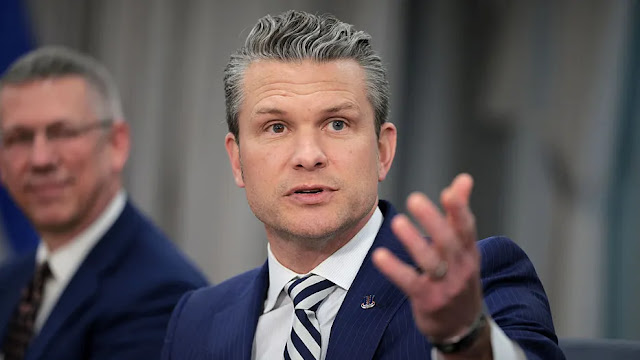Defense Secretary Pete Hegseth is pushing back forcefully against reports that he shared sensitive military information in an encrypted Signal group chat, calling the allegations a politically motivated smear campaign fueled by disgruntled insiders and a hostile media.
The controversy erupted after The New York Times reported Sunday that Hegseth allegedly used a private Signal chat in January—prior to his Senate confirmation—to discuss potential U.S. military strikes on Houthi militants in Yemen. The group reportedly included his wife, brother, personal lawyer, and a small circle of aides. Of those, only two are employed by the Pentagon. Hegseth’s wife, Jennifer, a former Fox News producer, is not a government official.
Speaking to reporters outside the White House Easter Egg Roll on Monday, Hegseth defiantly denied any wrongdoing.
“What a big surprise that a few leakers get fired and suddenly a bunch of hit pieces come out from the same media that peddled the Russia hoax,” he said, adding, “This is what the media does. They take anonymous sources from disgruntled former employees, and then they try to slash and burn people and ruin their reputations.”
While the Times story did not claim the shared information was classified, it cited four sources familiar with the chat who said the content related to operational military plans. Other outlets have since corroborated the report, fueling a second wave of scrutiny following a similar scandal involving National Security Advisor Mike Waltz and a Signal group chat exposed by The Atlantic in March.
President Trump, however, stood firmly behind his Defense Secretary.
“He’s doing a great job — ask the Houthis how he’s doing,” Trump said from the South Lawn, brushing off the allegations as media-driven noise.
White House press secretary Karoline Leavitt echoed that defense, blaming the Pentagon's entrenched bureaucracy for leaking against Hegseth.
“This is what happens when the entire Pentagon is working against you and working against the monumental change you are trying to implement,” she said Monday morning.
The messaging from Trump’s camp has been clear: Hegseth is a reformer under siege, and any controversy surrounding Signal chats is being weaponized to undermine his agenda.
Yet the uproar inside the Department of Defense is escalating.
Just last week, the Pentagon placed three of Hegseth’s top advisers—Dan Caldwell, Colin Carroll, and Darin Selnick—on administrative leave. The trio were later dismissed amid an ongoing internal investigation into leaks of sensitive information. In a joint statement, they claimed they were never formally told the nature of the accusations.
“Unnamed Pentagon officials have slandered our character with baseless attacks on our way out the door,” the statement read.
Adding to the firestorm, former Pentagon spokesman John Ullyot published a blistering op-ed in Politico, painting a portrait of dysfunction and internal strife under Hegseth’s leadership. Despite being a past supporter, Ullyot accused Hegseth’s team of spreading misinformation and predicted more personnel shakeups would follow.
In response to the leaks, the Pentagon’s inspector general launched an evaluation at the request of both the Democratic and Republican heads of the Senate Armed Services Committee. The review aims to determine whether operational details were inappropriately shared, and if so, by whom.
Still, Hegseth’s allies maintain there’s no evidence that classified material was ever disclosed.
“There was no classified information in any Signal chat, no matter how many ways they try to write the story,” said Pentagon spokesman Sean Parnell in a statement posted on X. “The Office of the Secretary of Defense is continuing to become stronger and more efficient in executing President Trump’s agenda.”
Meanwhile, The New York Times defended its reporting.
“The Pentagon has not denied the existence of the chat, and its assertion that there was no classified information shared is beside the point,” the paper said in a public statement. “Our reporting did not characterize the content as classified.”
As the fallout continues, the situation has become a case study in the collision between loyalty politics, operational security, and media accountability—just months into Hegseth’s tenure as Defense Secretary. With internal and external investigations mounting, the Pentagon finds itself under a cloud of mistrust, with reform efforts clashing headlong against institutional norms.












.jpg)
.jpg)


